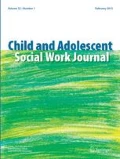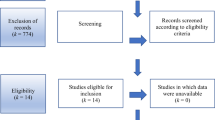Abstract
Youth Initiated Mentoring (YIM) is a new approach in child and family services, in which collaboration with natural mentors from within the social network of the young person is central. Young people themselves choose a mentor from within their environment. This mentor is their confidential advisor and he or she stands up for the interests of the young person. In addition, the YIM is a cooperation partner for parents and social workers. Research into the long-term effects is lacking, therefore, in the current study, a total of 24 (former) YIMs were interviewed (14 women, 10 men). The ages of the YIMs range from 23 to 78 years (M = 50, SD = 13.7). On average, the YIMs know the young people for a periode of 9 years and 6 months (SD = 5.1), family members not included. The YIM program were closed 6 months to 4 years ago (M = 2.3, SD = 1.12). The majority of YIMs keep in touch with the young person (75%) and currently most young persons lives at home or in within their community (79%). The YIM approach is a resilient and promising approach in social work, prerequisite that it is valued by parties involved.
Similar content being viewed by others
Data Availability
Yes.
References
Boeije, H. (2014) Analyseren in kwalitatief onderzoek. Denken en doen (2e druk). Den Haag: Boom Lemma uitgevers.
Bryman, A. (2012). Social research methods (4th ed.). New York: Oxford University Press Inc.
Erickson, L. D., McDonald, S., & Elder, G. H. (2009). Informal mentors and education: Complementary or compensatory resources? Sociology of Education, 82(4), 344–367. https://doi.org/10.1177/003804070908200403.
Evers, J. (2015). Kwalitatieve analyse: kunst én kunde. Amsterdam: Boom Lemma uitgevers.
Fusch, P., & Ness, L. R. (2015). Are we there yet? Data saturation in qualitative research. The Qualitative Report, 20, 1408–1416.
Guest, G., Bunce, A., & Johnson, L. (2006). How many interviews are enough? An experiment with data saturation and variability. Field Methods, 18, 59–82. https://doi.org/10.1177/1525822X05279903525822X05279903.
King, C. A., Arango, A., Kramer, A., Busby, D., Czyz, E., Foster, C. E., & Gillespie, B. W. (2019). Association of the youth-nominated support team intervention for suicidal adolescents with 11- to 14-year mortality outcomes: Secondary analysis of a randomized clinical trial. JAMA Psychiatry, 76(5), 492–498. https://doi.org/10.1001/jamapsychiatry.2018.4358.
Parnes, M. F., Suárez-Orozco, C., Osei-Twumasi, O., & Schwartz, S. E. O. (2020). Academic outcomes among diverse community college students: What is the role of instructor relationships? Community College Review, 48(3), 277–302. https://doi.org/10.1177/0091552120909908.
Raposa, E. B., Dietz, N., & Rhodes, J. E. (2017). Trends in Volunteer Mentoring in the United States Analysis of a Decade of Census Survey Data. American Journal of Community Psychology, 1, 1–12. https://doi.org/10.1002/ajcp.12117.
Schwartz, S. E. O., Rhodes, J. E., Spencer, R., & Grossman, J. B. (2013). Youth initiated mentoring: Investigating a new approach to working with vulnerable adolescents. American Journal of Community Psychology, 52, 155–169. https://doi.org/10.1007/s10464-013-9585-3.
Schwartz, S. E. O., Kanchewa, S. S., Rhodes, J. E., Cutler, E., & Cunningham, J. L. (2016). “I didn’t know you could just ask:” Empowering underrepresented college-bound students to recruit academic and career mentors. Children and Youth Services Review, 64, 51–59.
Schwartz, S. E. O., Kanchewa, S. S., Rhodes, J. E., Gowdy, G., Stark, A. M., Horn, J. P., et al. (2017). “I’m having a little struggle with this, can you help me out”: Examining impacts and processes of a social capital intervention for first-generation college students. American Journal of Community Psychology, 61(1–2), 166–178. https://doi.org/10.1002/ajcp.12206.
Spencer, R., Basualdo-Delmonico, A., Walsh, J., & Drew, A. L. (2017). Breaking Up Is Hard to Do: A Qualitative Interview Study of How and Why Youth Mentoring Relationships End. Youth & Society, 49, 438–460. https://doi.org/10.1177/0044118X14535416.
Spencer, R., Gowdy, G., Drew, A. L., & Rhodes, J. E. (2019). “Who knows me the best and can encourage me the most?”: Matching and early relationship development in Youth-Initiated-Mentoring relationships with system-involved youth. Journal of Adolescent Research, 34, 3–29. https://doi.org/10.1177/0743558418755686.
van Dam, L., Bakhuizen, R. E., Schwartz, S. E. O., De Winter, M., Zwaanswijk, M., Wissink, I., & Stams, G. J. J. M. (2019a). An Exploration of Youth–Parent–Mentor Relationship Dynamics in a Youth-Initiated Mentoring Intervention to Prevent Out-of-Home Placement. Youth and Society, 51, 915–933. https://doi.org/10.1177/0044118X19857867.
van Dam, L., Klein Schaarsberg, R., Wissink, I. B., Zwaanswijk, M., Stams, G. J. J. M., & Schwartz, S. E. O. (2018). Youth Initiated Mentoring: A Mixed Methods Follow-Up Study among Youth At-Risk for Out-of-Home Placement. Submitted for publication.
van Dam, L., Neels, S., De Winter, M., Branje, S., Wijsbroek, S., Hutschemaekers, G., & Stams, G. J. (2017). Youth initiated mentors: Do they offer an alternative for out-of-home placement in youth care? The British Journal of Social Work, 47, 1764–1780. https://doi.org/10.1093/bjsw/bcx092.
van Dam, L., Smit, D., Wildschut, B., Branje, S. J. T., Rhodes, J. E., Assink, M., & Stams, G. J. J. M. (2018). Does natural mentoring matter? A multilevel meta-analysis on the association between natural mentoring and youth outcomes. American Journal of Community Psychology, 62, 203–220. https://doi.org/10.1002/ajcp.12248.
van Dam, L., & Verhulst, S. (2016). De YIM-aanpak. Het alternatief voor uithuisplaatsing van jongeren. Amsterdam: Boom uitgevers.
van Dam, L., Van Gils, S., Brekelmans, K., Stams, G.J.J.M., & Prieto-Flores, O (2019). Is relationship quality between mentor and mentee related to psychosocial problems and resilience? Manuscript submitted for publication.
van Dam, L., & Schwartz, S. (2020). Cultivation of natural mentors to strengthen resiliency in youth: A program theory of Youth Initiated Mentoring (YIM). Journal of Social Intervention: Theory and Practice, 29(1), 3–20.
Wester, F. (2003). Rapporteren over kwalitatief onderzoek. Utrecht: Lemma BV.
Whitney, S. D., Hendricker, E. N., & Offutt, C. A. (2011). Moderating factors of natural mentoring relationships, problem behaviors, and emotional well-being. Mentoring & Tutoring: Partnership in Learning, 19, 83–105. https://doi.org/10.1080/13611267.2011.543573.
Funding
Funding for this project was obtained by ZONMW, the Netherlands Organisation for Health Research and Development, Project Number 729310004.
Author information
Authors and Affiliations
Contributions
LD was the leading author, he designed the study, conducted the funding, did the interpretation of the data, and wrote the manuscript. LH supported with the data collection, interpretation of the data and writing the manuscript. GJS supported with the interpretation of the data en reviewed the manuscript.
Corresponding author
Ethics declarations
Conflict of interest
The authors declare that they have no conflict of interest.
Additional information
Publisher's Note
Springer Nature remains neutral with regard to jurisdictional claims in published maps and institutional affiliations.
Rights and permissions
About this article
Cite this article
van Dam, L., Heijmans, L. & Stams, G.J. Youth Initiated Mentoring in Social Work: Sustainable Solution for Youth with Complex Needs?. Child Adolesc Soc Work J 38, 149–155 (2021). https://doi.org/10.1007/s10560-020-00730-z
Accepted:
Published:
Issue Date:
DOI: https://doi.org/10.1007/s10560-020-00730-z



